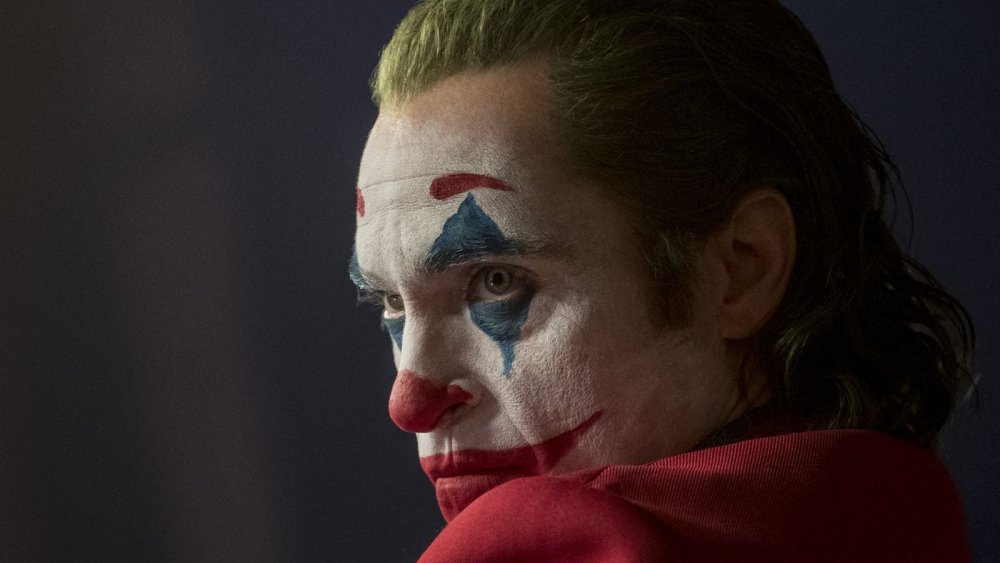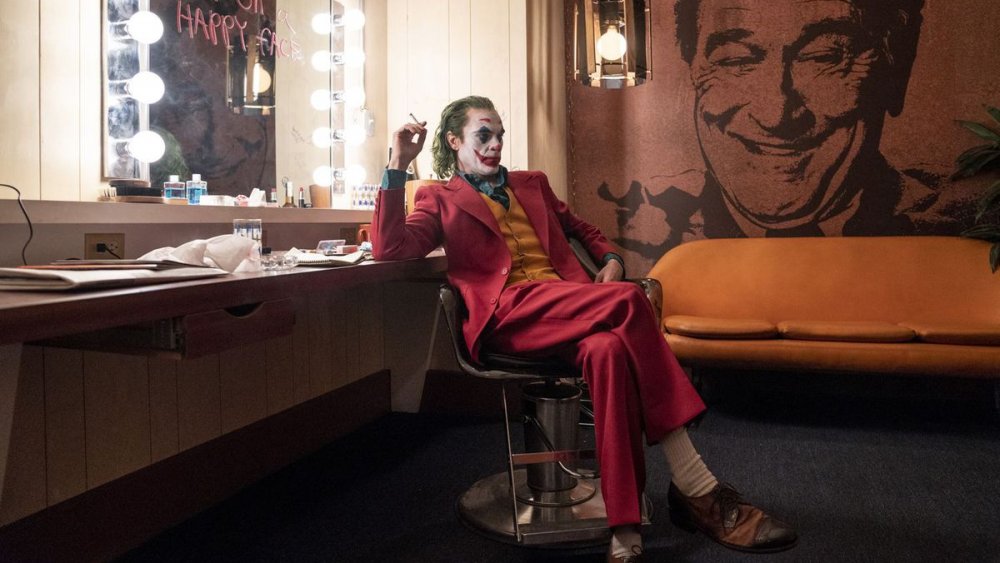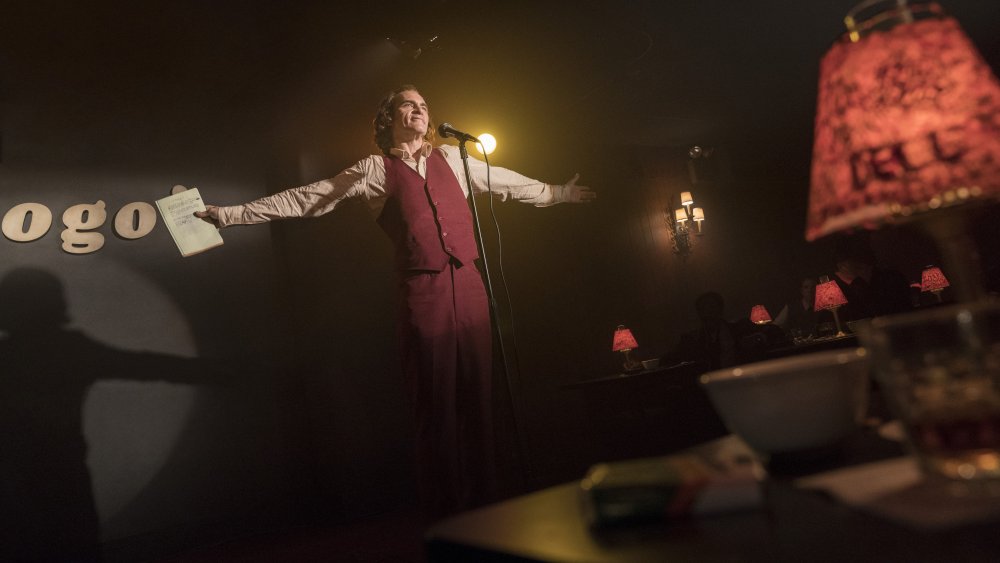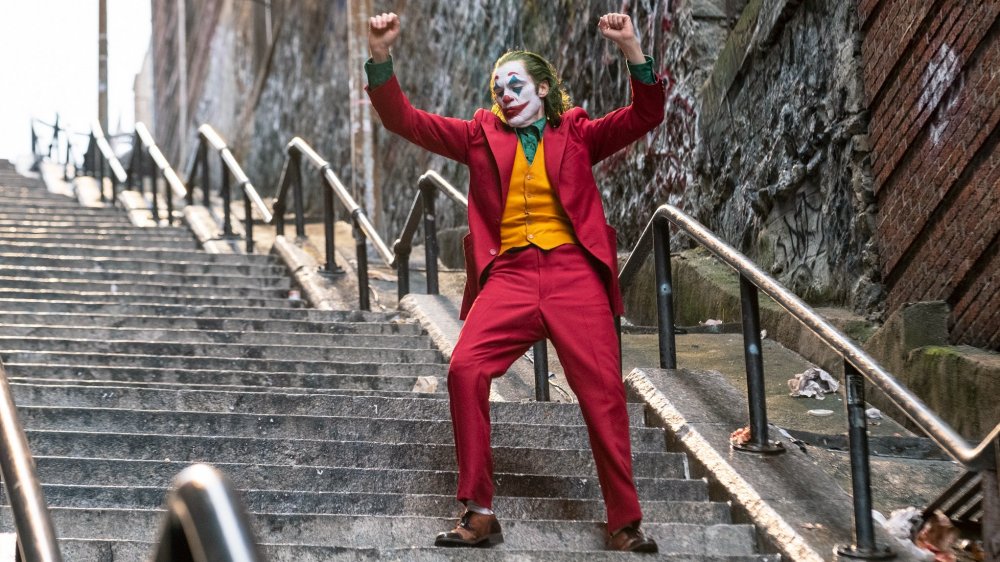Editor Jeff Groth Opens Up About Joker - Exclusive Interview
Joker did what many comic book-inspired films before it couldn't: It got critics to take the genre seriously. Sure, Heath Ledger won a posthumous Oscar for The Dark Knight and Black Panther scored a Best Picture nomination, but with 11 Academy Awards noms (and two wins), there's no doubt that Joker is among the most acclaimed comic book movies of all time.
Editor Jeff Groth — who scored his own Academy Award nomination — has a lot to do with that. A frequent collaborator of Joker director Todd Phillips, Groth has cuts everything from TV comedies to documentaries, but Joker might just be his most impressive work yet. Groth's editing really drives home Joker's controversial violence and, for better or worse, put you right in the head of its disturbed main character.
In his discussion with Looper, Groth touches on the films that inspired Joker, what it was like to edit a movie with such an unreliable narrator, the movie's rumored alternate ending, its unexpected comedy, and much, much more.
The films that inspired Joker, and why the movie is unexpectedly so funny
Many people involved with this production say is that Joker is based on a comic, but isn't a comic book movie. To you, what does that mean? What's the difference?
It wasn't tied to any specific story that came before, for one. It was tied to a character, but it wasn't tied to any specific story that the character had been in that we've seen prior to that. In fact, I would say, from what I know, it's more tied to the inspiration for that character than anything else.
As far as my involvement, when I was putting it together, we always looked at it as a movie first and a story first. We were always serving that idea that we want to make a good movie. Not a comic book movie. The comic book movie was always going to be in there, but it wasn't at the forefront of our minds.
This movie evokes a lot of films from the past, especially from the '70s. Before you started cutting, did you look to any movies in particular for inspiration?
You know, there's a few that have gotten mentioned quite a bit, which are King of Comedy, Taxi Driver, The French Connection, Dog Day Afternoon, Network. All of those, definitely. I watched those for sure.
Beyond that, when we started shooting in the fall and before, early in the summer, I asked Todd what I should be watching for inspiration. He really said there wasn't anything in particular. It was just watch and see how movies were made then, outside of some clear influences.
When you looked at the script, it was like, "Okay, that I want to watch this because I know that this piece of the script reminds me of this, I wanted to see how that was done." The chase, for example. You know there's a chase under the elevated train, and it's like, "Okay, let's take a look and see what The French Connection did," because that was great.
You've done a lot of comedies, and while Joker is not a comedy, comedy is a big part of it. Did any of the lessons that you learned doing comedies apply here?
Yeah, I think so, definitely. I mean, I've done kind of both, but I think that in any comedy you need moments of drama, and possibly tragedy. This movie, we always described it as a tragedy. You need moments of comedy to contrast. You kind of need to know what you're up against in a way. Life is both.
Any movie that goes so far down one way, that is a tragedy or a dark drama but doesn't have any moment of lightness, it's difficult to sit through and watch. I think that you'll find funny even in the darkest places. That's definitely intentional. Again, it mirrors life. I mean, I've always tried to cut comedies kind of like dramas, because it makes the comedy itself more real. It doesn't feel so manipulated. Also, you need to have some sort of feeling for the characters if you're to find what they say funny.
Do you have any favorite comedic moments in Joker?
When Gary can't get out the door after [Joker's] killed Randall. It's funny, in a way. it's crazy to call that a comedic moment, but it really is. I mean, that scene overall is an amazing scene because it starts with this tension and then it explodes into violence and then it becomes comedic. He does what you wouldn't expect. [Joker] starts talking about the Murray Franklin show and he lets Gary go. While it's kind of horrific at the same time, it's funny.
Audiences have always laughed at that moment. It was always very gratifying to watch an audience laugh at that moment because it releases you from that horrific tension that you've just witnessed. I really love that scene and I love that moment for that reason.
How Jeff Groth put you inside the Joker's head
The movie takes place from Joker's point of view, and you were editing it for about a year. Was it hard to be in that sort of dark psychological space for so long?
Yeah, it was. It was about a year from the time that we started shooting to the time that it premiered at Venice. It was almost exactly a year. I would say I was in that headspace for that whole time. I mean, really, I feel like I didn't think about much else that entire time. In fact, coming out around September, I ended up feeling like the world had changed a little bit. I hadn't really been paying attention since, for about a year.
It was really all-encompassing. I would go home at night and still be thinking, "What do we need to do next? What is he capable of next? What should we be exploring or what do we need to go back and look at?" Beyond that, it's difficult to describe how I needed to live in that headspace. It was definitely really the hardest job I've ever had, but again, in the best way possible.
As Joker goes on, we learn that he's a very unreliable narrator. Was it hard to keep from tipping your hand too soon, and let on that what you're seeing onscreen is not necessarily what's happening?
I don't know if it was hard. It wasn't so much about like, "Oh are we tipping our hand too much to the unreality here?" It was kind of like, "Let's just make this real and then you're going to find out," or you're going to have to decide for yourself later what was real and what wasn't.
Maybe going back and looking at it a second time, you pick up on these clues, but they're clues that are built into the scene. We weren't building in clues that said this is going to be unreal, necessarily. Most of the time, you're going to watch it the first time and you're going to believe most of what's there. Then we're going to say, "You know what? Maybe you shouldn't. Maybe if you watched it again, you'd see what we're talking about here."
Are there any hints about what's real or not?
For example, with Sophie, whenever she's a delusion, she appears. She doesn't walk into the scene. She's not with him, necessarily. She's sitting in the audience at the comedy club. She walks up to him. She kind of appears at the stand. They'd be walking together, but she kind of appears in the scene. she appears at his door. Why would she appear at his door at the middle of the night? Why would she be there? Why would she do that? And he's not surprised to see her!
There are certain things that make you go, "Okay." It's taken as weird the first time. What I loved about her whole storyline is that the first time you watch it you say, "Oh okay, they kind of shoehorned this love interest in," and it's like, "No, we weren't doing that at all." In fact, you were right. It is unusual, these things. None of these were really happening.
There's a rumor that the original ending to this movie involved Joker killing young Bruce Wayne. Is there any truth to that?
No, no. That final scene has always just been in there. It would have been interesting, but that's not the case. I don't even know what the reaction would have been to that.
Why Joker is unlike any other movie Jeff Groth has made
There's been a lot written about how Joaquin Phoenix had the freedom to improvise on the set of the movie. Does having that much footage available for you make your job easier or harder?
It makes it harder, but in the best way possible. I mean, when you have a lot of valid choices to choose from, you really start with a bit of a guessing game. You say, "Okay, right now I think that this is what's best," and then as you build context around it, you end up having to go back and re-look at those pieces and say, "Okay, now this still looks best, given what we've built on."
He's got this daring genius that would allow for things that I've never seen before. I can't even describe how amazing it felt to watch new things every day. I mean, if I could show everybody everything I would, because it's incredible.
You cut the film, when you could, in chronological order. Is that a normal thing that you do when you edit?
Not necessarily. I think every filmmaker and every actor probably would love to shoot a movie sequentially. For me, even cutting it, I would love to be able to do it. Typically, it's not how you do it. You just take things as they come in. We did that to a large extent, too, when we could.
I mean, I was never really able to keep up entirely. If I had a surplus of scenes, I would always go to the earliest ones. The reason we did that was, because it's such a character study, to kind of make it feel that we were shooting sequentially as much as possible. Then, if anybody needed to come in and look, whether it be Todd or Joaquin or whomever, to look at where we were at, we were building from the beginning.
You always kind of knew where you were. It's like, "Okay, we're shooting something in the middle. Do we need to go back and look at this?" If we did, then we've got something that is kind of linear to that point. In some ways, it's interesting when you're not doing it that way, if you're cutting scenes from the end, they can be helpful to know where you're going, when you go back and look at what you're getting, but then again, once you build context, everything can change. If you find that you've got something that alters the end, then you have to go back and recut that.
Yeah, it's unusual. We attempted to do something similar too in War Dogs with Todd. I know he likes the idea. Again, I think he likes the idea of shooting sequentially, even though he can't. I think it's comforting to kind of cut that way.
How much of the scene of Joker dancing on the steps came together in editing versus on the set?
Well, Joaquin was actually dancing to that song [Gary Glitter's "Rock and Roll II"]. Those moves were choreographed to that song. Then the way that that came together is, I mean, ultimately, the dance is shorter than it was to begin with. You also see it in slow motion. You can't time something that's running at half speed to the music.
What I did with it is, I cut the entire dance in real time. I kept the slow-motion pieces and had them sped up so that I could cut them in real time and keep multiple takes in sync with the choreography. Then, now that I've got this set up in real time, I went back and looked at the slow-motion pieces and took what I thought was the most essential action amongst that piece.
It's not necessarily continuous, but each piece kind of synced up with the motion. You don't see every foot move into the next dance move, but you see the aspects of each move as it's going. Then, of course, you do things like you cut the song down. There are a lot of things you end up doing to fit everything in. Kind of shuffle things back and forth. Yes, it was a fun sequence to cut.
Is there anything about Joker that you're particularly proud of that you think deserves more attention?
I mean, I've said quite a bit about it. The only thing I can really say is that from the moment I read the script I loved it. It's really been kind of, in many ways, a kind of a culmination of everything I've been working toward in my career, because it was a great script with an audience who you knew were people who were going to see it.
A director, there's nobody I'd rather work with than Todd. I mean he's an incredible director, and then he hired Joaquin, and he lifted the whole thing even beyond what I knew we were going into. I really can't imagine a better project. Everybody should be jealous.



